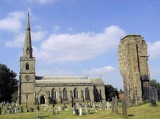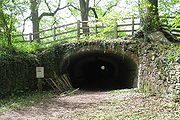
Ticknall
Encyclopedia
Ticknall is a small village and civil parish in South Derbyshire
, England. Situated on the A514 road, close to Melbourne
, it has three pubs, several small businesses, and a primary school. Two hundred years ago it was considerably larger and noisier with lime quarries, tramway
s and potteries. Coal
was also dug close to the village. Close to the village is Calke Abbey
, now a National Trust
property.
The old village of Tichenhalle is mentioned in the Domesday Book
, and probably existed from Anglo-Saxon
times. Ticknall was an estate village to Calke Abbey until late in the 20th century. It reached its hey-day in the late 18th and early 19th centuries, when the lime
yards and the brickmaking, tile and pottery industries were operating at maximum capacity. The population reached 1500, treble the present number of around 500. Since the neighbouring Calke Abbey changed its status in 1984 from long-standing private occupation by the Harpur-Crewe family to semi-public administration by the National Trust, much of the village has changed. The break-up of the former estate has meant the sale of cottages and building land, altering not only the randomness of the architecture, but also the dilution of the former feudal relationship between the villagers and their somewhat reclusive lords of the manor
. The village has developed with examples of new buildings and renovations.
 Near the entrance to Calke Abbey is Tramway Bridge which is now a Grade II listed structure. There is also a tramway tunnel, almost 140 yards in length, under the drive to Calke Abbey. The National Trust restored it in the 1990s and you can walk through (the floor is uneven and can be slippery, having a torch is also helpful). It was built in 1802 by the Derbyshire Engineer Benjamin Outram
Near the entrance to Calke Abbey is Tramway Bridge which is now a Grade II listed structure. There is also a tramway tunnel, almost 140 yards in length, under the drive to Calke Abbey. The National Trust restored it in the 1990s and you can walk through (the floor is uneven and can be slippery, having a torch is also helpful). It was built in 1802 by the Derbyshire Engineer Benjamin Outram
to carry the former Ticknall Tramway and subsequently connect the brickyards and limeyards around the village to the Ashby canal
at Willesley
Basin. It was too costly to build the expensive locks which would be required to bring the canal to Ticknall so the Tramway was constructed as a cheaper alternative. Although abandoned in 1915, the tramway can still be traced intermittently along its route which passed through the estate of Calke Abbey where two tunnels were needed.
At the start of the 19th century the Ticknall Limeyards were operated by two different classes of people, namely freeholders and tenants. Some of the freeholders in the parish had their own limeyards while others were worked by tenants for the Harpur-Crewe and Burdett families. As the century progressed the freeholders went bankrupt for various reasons while the tenants of the Harpur-Crewe family gave up because of the high rents charged and general mismanagement of the limeyards.
The village boasts two good pubs, The Staff of Life and the Chequers Inn. The latter dates from the 17th century and is known for purveying fine ales from all over the country. On the lanes throughout the village can be found several water pumps. These sturdy and attractive cast iron devices were introduced into the village around 1914 by Sir Harper Crewe to, what was then, the estate village to provide fresh water. Several of these unusual pumps still work and are still used by walkers.
File:St George Ticknall with remains of old church.jpg|St George Ticknall with remains of old church
File:Ticknall Methodist Chapel.JPG|Ticknall Methodist Chapel
File:Ticknall Water Pump.JPG|One of several Water Pumps
File:Staff of Life Ticknall.jpg|Staff of Life
File:Chequers Inn Ticknall.jpg|Chequers Inn
South Derbyshire
South Derbyshire is a local government district in Derbyshire, England. It contains a third of the National Forest, and the council offices are in Swadlincote....
, England. Situated on the A514 road, close to Melbourne
Melbourne, Derbyshire
Melbourne is a Georgian market town in South Derbyshire, England. It is about 8 miles south of Derby and 2 miles from the River Trent. In 1837 a then tiny settlement in Australia was named after William Lamb, 2nd Viscount Melbourne, Queen Victoria's first Prime Minister, and thus indirectly takes...
, it has three pubs, several small businesses, and a primary school. Two hundred years ago it was considerably larger and noisier with lime quarries, tramway
Rail transport
Rail transport is a means of conveyance of passengers and goods by way of wheeled vehicles running on rail tracks. In contrast to road transport, where vehicles merely run on a prepared surface, rail vehicles are also directionally guided by the tracks they run on...
s and potteries. Coal
Coal
Coal is a combustible black or brownish-black sedimentary rock usually occurring in rock strata in layers or veins called coal beds or coal seams. The harder forms, such as anthracite coal, can be regarded as metamorphic rock because of later exposure to elevated temperature and pressure...
was also dug close to the village. Close to the village is Calke Abbey
Calke Abbey
Calke Abbey is a Grade I listed country house near Ticknall, Derbyshire, England, in the care of the charitable National Trust.The site was an Augustinian priory from the 12th century until its dissolution by Henry VIII...
, now a National Trust
National Trust for Places of Historic Interest or Natural Beauty
The National Trust for Places of Historic Interest or Natural Beauty, usually known as the National Trust, is a conservation organisation in England, Wales and Northern Ireland...
property.
The old village of Tichenhalle is mentioned in the Domesday Book
Domesday Book
Domesday Book , now held at The National Archives, Kew, Richmond upon Thames in South West London, is the record of the great survey of much of England and parts of Wales completed in 1086...
, and probably existed from Anglo-Saxon
Anglo-Saxons
Anglo-Saxon is a term used by historians to designate the Germanic tribes who invaded and settled the south and east of Great Britain beginning in the early 5th century AD, and the period from their creation of the English nation to the Norman conquest. The Anglo-Saxon Era denotes the period of...
times. Ticknall was an estate village to Calke Abbey until late in the 20th century. It reached its hey-day in the late 18th and early 19th centuries, when the lime
Agricultural lime
Agricultural lime, also called aglime, agricultural limestone, garden lime or liming, is a soil additive made from pulverized limestone or chalk. The primary active component is calcium carbonate...
yards and the brickmaking, tile and pottery industries were operating at maximum capacity. The population reached 1500, treble the present number of around 500. Since the neighbouring Calke Abbey changed its status in 1984 from long-standing private occupation by the Harpur-Crewe family to semi-public administration by the National Trust, much of the village has changed. The break-up of the former estate has meant the sale of cottages and building land, altering not only the randomness of the architecture, but also the dilution of the former feudal relationship between the villagers and their somewhat reclusive lords of the manor
Lord of the Manor
The Lordship of a Manor is recognised today in England and Wales as a form of property and one of three elements of a manor that may exist separately or be combined and may be held in moieties...
. The village has developed with examples of new buildings and renovations.

Benjamin Outram
Benjamin Outram was an English civil engineer, surveyor and industrialist. He was a pioneer in the building of canals and tramways.-Personal life:...
to carry the former Ticknall Tramway and subsequently connect the brickyards and limeyards around the village to the Ashby canal
Ashby-de-la-Zouch Canal
The Ashby-de-la-Zouch Canal is a long canal in England which connected the mining district around Moira, just outside the town of Ashby-de-la-Zouch, with the Coventry Canal at Bedworth in Warwickshire. It was opened in 1804, and a number of tramways were constructed at its northern end, to service...
at Willesley
Willesley
Willesley is a place near Ashby-de-la-Zouch. It was in Derbyshire but is now part of Leicestershire. In the 19th century it had a population of about 60 and Willesley Hall was the home of the Abney and later the Abney-Hastings family. Willesley is so small that it would be a hamlet except that it...
Basin. It was too costly to build the expensive locks which would be required to bring the canal to Ticknall so the Tramway was constructed as a cheaper alternative. Although abandoned in 1915, the tramway can still be traced intermittently along its route which passed through the estate of Calke Abbey where two tunnels were needed.
At the start of the 19th century the Ticknall Limeyards were operated by two different classes of people, namely freeholders and tenants. Some of the freeholders in the parish had their own limeyards while others were worked by tenants for the Harpur-Crewe and Burdett families. As the century progressed the freeholders went bankrupt for various reasons while the tenants of the Harpur-Crewe family gave up because of the high rents charged and general mismanagement of the limeyards.
The village boasts two good pubs, The Staff of Life and the Chequers Inn. The latter dates from the 17th century and is known for purveying fine ales from all over the country. On the lanes throughout the village can be found several water pumps. These sturdy and attractive cast iron devices were introduced into the village around 1914 by Sir Harper Crewe to, what was then, the estate village to provide fresh water. Several of these unusual pumps still work and are still used by walkers.
Notable residents
- Ted MoultTed MoultEdward Walker "Ted" Moult was a British farmer at Scaddows Farm near Ticknall, Derbyshire, who became a radio and television personality.- Early life :...
, TV Personality, farmed here - John Smith, who was awarded the VCVictoria CrossThe Victoria Cross is the highest military decoration awarded for valour "in the face of the enemy" to members of the armed forces of various Commonwealth countries, and previous British Empire territories....
, was born here in 1814. - Henry DennisHenry DennisHenry Dennis was a nineteenth century hymnist, who earned worldwide fame for his hymn tune, 'Euphony'.A Leicestershire farmer, Dennis composed fifty-four anthems and six hymn tunes...
, Hymnist and Composer was born here in 1818.
Gallery
File:St George Ticknall with remains of old church.jpg|St George Ticknall with remains of old church
File:Ticknall Methodist Chapel.JPG|Ticknall Methodist Chapel
File:Ticknall Water Pump.JPG|One of several Water Pumps
File:Staff of Life Ticknall.jpg|Staff of Life
File:Chequers Inn Ticknall.jpg|Chequers Inn

